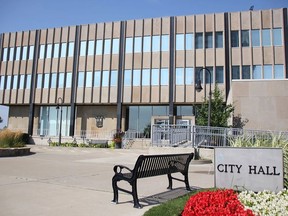Sarnia will still start 2024 without a development charges by law, but for a significantly shorter period of time.

Sarnia will still start 2024 without a development charges by law, but for a significantly shorter period.
Advertisement 2
Article content
City council voted 8-1 at a special meeting Tuesday to undo a November decision — to extend public input on the city’s new bylaw — that had the unintended consequence of leaving Sarnia without the ability to collect development charges for at least three months.
Article content
Instead, a public input meeting and council deliberations are set for Jan. 15, to approve a new framework for charging builders housing start fees.
Money collected helps offset the cost of related infrastructure projects, such as watermains and roads, the city pays fo.
So, with the current five-year-old bylaw expiring Dec. 31 and a legal opinion that it can’t be extended, engineering and operations general manager David Jackson said, the city will have no development charges bylaw for the first 15 of the new year.
Advertisement 3
Article content
New housing projects started during that time won’t pay development charges, Jackson said, noting the difference in city revenue eventually will have to be made up in raised taxes, or increased water and sewer rates.
Council had the opportunity to approve the development charges by law in Decemberwhen city staff warned of the tax-hike implications of going without the bylaw.
Coun. Adam Kilner, one of five councilors who voted to extend public input and, under council’s rules of order, one of five who could ask for a reconsideration, said there was some confusion Dec. 11 when council let that opportunity slide.
“I think a lot of us were still thinking about the budget (passed Dec. 5) and just not realizing exactly what the process was,” he said.
Advertisement 4
Article content
Realizing the implications in the aftermath, he asked for Tuesday’s special meeting to make the change.
“Of course we don’t know numbers, but we could possibly be leaving hundreds of thousands or millions of dollars on the table,” by leaving a three-month development charge void, Kilner said.
“We can further explore once it’s implemented how it might be amended, but for the time being, we’ve had the studyand as far as I’m concerned, it’s time to move forward.”
A $193,000 Watson and Associates study and bylaw update for the city recommends a 30 per cent increase with the caveat that under new provincial rules only 80 per cent is charged in the first year — effectively making the fees cheaper for builders in 2024.
Development charges currently range from $19,000, for new house construction in most parts of the city, to $36,000 in Development Area 2, and would rise to range from $21,000 to about $43,000, a city report says.
Advertisement 5
Article content
The cost for 80 per cent, the amount that would be billed in 2024 under provincial phase-in rules, would be $17,000 to $35,000, it says.
Coun. Bill Dennis, who was the lone vote against not doing the public input extension Tuesday, said the rates aren’t competitive with neighboring municipalities and he worries people will move elsewhere.
Coun. Terry Burrell argued Sarnia has way more services and infrastructure it needs to pay for, which warrants the higher charges.
“We are a city, we are not a rural community,” chief administrator Chris Carter said, recommending council go with Kilner’s proposal.
Council also might have to reconsider its budget, depending on the amount of building activity and lost development-charge revenue to start the year, Carter said.
Advertisement 6
Article content
It’s unknown what the impact will be because it depends on the number of new builds that start during the bylaw blackout, he said
Jackson confirmed the city’s rates are set by calculating the cost of projects needed for growth in an area of the city, and dividing that by the number of new homes expected to be built there.
Collecting anyway without a bylaw likely would spur a legal challenge the city would lose, forcing it to repay the money, he said in response to a question from Coun. Anne Marie Gillis.
Sarnia-Lambton real estate board president Rob Longo, who had asked for the public input extension to give time to review the numbers, said he’s disappointed, but understands.
Concerns are if Sarnia’s prices are too high, it’ll drive development elsewhere, he said.
The city needs to allow more time in general to consult stakeholders and have a collaborative community approach before making decisions, instead of just “minimum statutory required public input times,” he said.
The background study was released Oct. 4 and stakeholders were consulted Oct. 10, said Daryl Abbs of Watson and Associates.
There’s no time now for the real estate board’s consultant to provide analysis before Jan. 15, said Longo.
“We’ll do whatever analysis we can do ourselves, as much as we can to provide information,” he said.
Article content